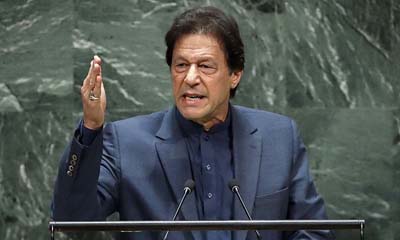
Pakistan’s ambivalence on Afghanistan
Abdul Basit
Writing in The Washington Post on Afghanistan on September 26, Prime Minister Imran Khan observed: “All those who have invested in the Afghan peace process should resist the temptation for setting unrealistic timelines. A hasty international withdrawal from Afghanistan would be unwise. We should also guard against regional spoilers who are not interested in peace and see instability in Afghanistan as advantageous for their own geopolitical ends.”
And on September 25, while addressing the United Nations General Assembly, the prime minister emphasized that Pakistan had already done whatever was possible in terms of persuading the Taliban to talk to the United States and then participate in the intra-Afghan negotiations (IAN). Hence, Pakistan should not be held responsible if the IAN did not deliver for a slew of reasons.
The US-Taliban talks resulted in the February 29 agreement that, inter alia, also stipulated the withdrawal of US forces from Afghanistan by May 2021. Earlier, the IAN which was supposed to commence on March 10 could not begin as the Kabul government took time to release 5,000 Taliban prisoners. The IAN finally started in Doha on September 12.
Pakistan jubilantly welcomed the February 29 agreement that implied that Islamabad fully agreed with all its provisions and would expect all sides to honor them. Similarly, Pakistan reiterated its fundamental position in the inaugural session of IAN that peace and stability in Afghanistan were essential for peace and economic development of Pakistan, as well for the honorable return of close to two million Afghan refugees from Pakistan.
Meanwhile, Pakistan maintained its contacts with the warring sides, encouraging them to work out compromises lest the historic opportunity that had been created after protracted and painstaking efforts be squandered, descending the landlocked country in another unpredictable and gory civil war. The Taliban delegation visited Pakistan in August; Imran Khan spoke to President Ashraf Ghani before his address to the UNGA; and Dr. Abdullah Abdullah, Chairman Afghanistan’s High Council for Reconciliation, paid a three-day visit to Pakistan toward the end of September. President Ghani is also expected to visit Islamabad soon.
Imran Khan’s advice against precipitate withdrawal of US forces does seem problematic, if not incongruent. The Taliban in a quick response to his suggestion underscored that the continuation of the intra-Afghan negotiations depended on full implementation of the February 29 agreement, and that any deviation from that would imperil the entire peace process.
Against this backdrop, Imran Khan’s advice against precipitate withdrawal of US forces does seem problematic, if not incongruent. The Taliban in a quick response to his suggestion underscored that the continuation of the IAN depended on full implementation of the February 29 agreement, and that any deviation from that would imperil the entire peace process.
Pakistan is fully cognizant of the ground realities in Afghanistan. Imran Khan’s advice betrays the latent worries as the Taliban have so far refused to oblige the Kabul administration by spurning its demand of a ceasefire that is seen as critical for the success of the IAN. The Taliban’s contention remains that such demands are extraneous to the February 29 agreement and had to be negotiated rather than to be set as a precondition for the IAN.
It seems that Pakistan is not very confident that the IAN would lead to any conclusive result. Rather, there is every possibility that these talks could end abruptly and collapse. In any case, it would be foolhardy to expect the IAN to be making tangible and irreversible progress before May/June next year. What Pakistan is now suggesting to the US is to wait and see how the intra-Afghan talks proceed and then take a decision about its withdrawal from Afghanistan.
This position is similar to not only what the Kabul administration has been desperately wanting but also in line with what India has been saying all along that the withdrawal of foreign forces would put in danger all the gains that have been made since the ouster of the Taliban in 2001. India has invested substantially in the anti-Taliban forces, and its adversarial interests are being well served with an unstable and chaotic Afghanistan.
It is, however, not clear whether the US, which is presently in the election mode, would revisit the drawing board and find Imran Khan’s suggestion agreeable. It is possible that Joe Biden who, as vice president in the Obama administration, was averse to the surge of US troops in Afghanistan, may prefer to stick to the February 29 agreement. Thus, the road to peace in Afghanistan is still strewn with many uncertainties.
Be that as it may, Pakistan can ill-afford to be taking inherently contradictory positions, and in the process alienate all the players inside and outside Afghanistan at the end. There was no point for Prime Minister Imran Khan to have floated his proposal at this premature stage and create for no good reason apprehensions in the Taliban camp. Maybe the idea is to build pressure on the Taliban to agree to a ceasefire as being demanded by the Kabul government. However, that seems unlikely to happen. The Taliban are neither keen on electoral democracy nor will they ever be amenable to play a second fiddle to the Kabul administration.
Pakistan is unquestionably in a cleft stick but it must avoid being in a funk. Every situation does not warrant a statement: Sometimes it is better to stay quiet and calibrate. Pakistan must be patient and pursue sub-rosa diplomacy rather than inadvertently compromise its interests by excessive and untimely use of the megaphone.
Abdul Basit is the president of Pakistan Institute for Conflict and Security Studies. He was previously Pakistan’s ambassador to Germany and Pakistan’s High Commissioner to India.
